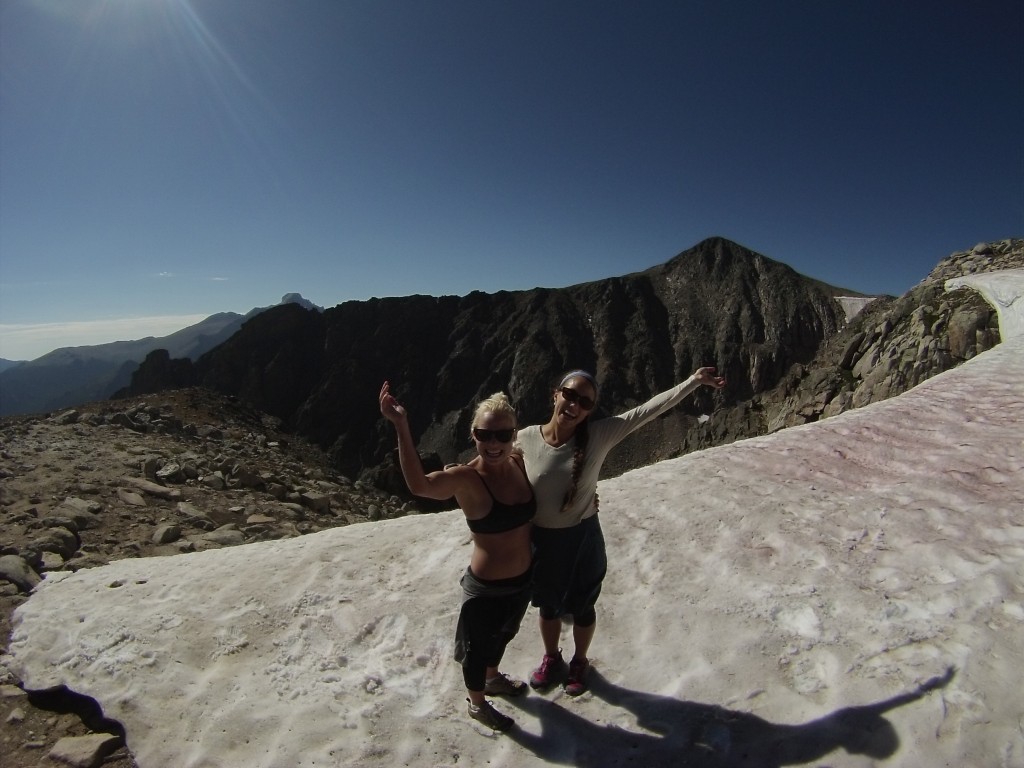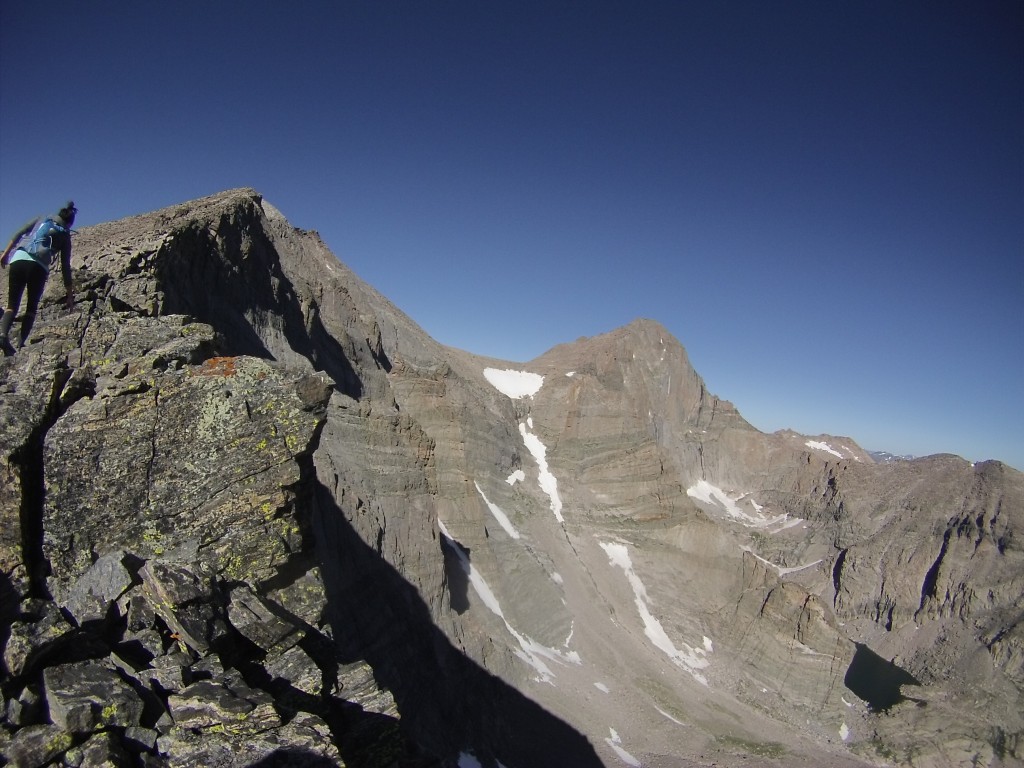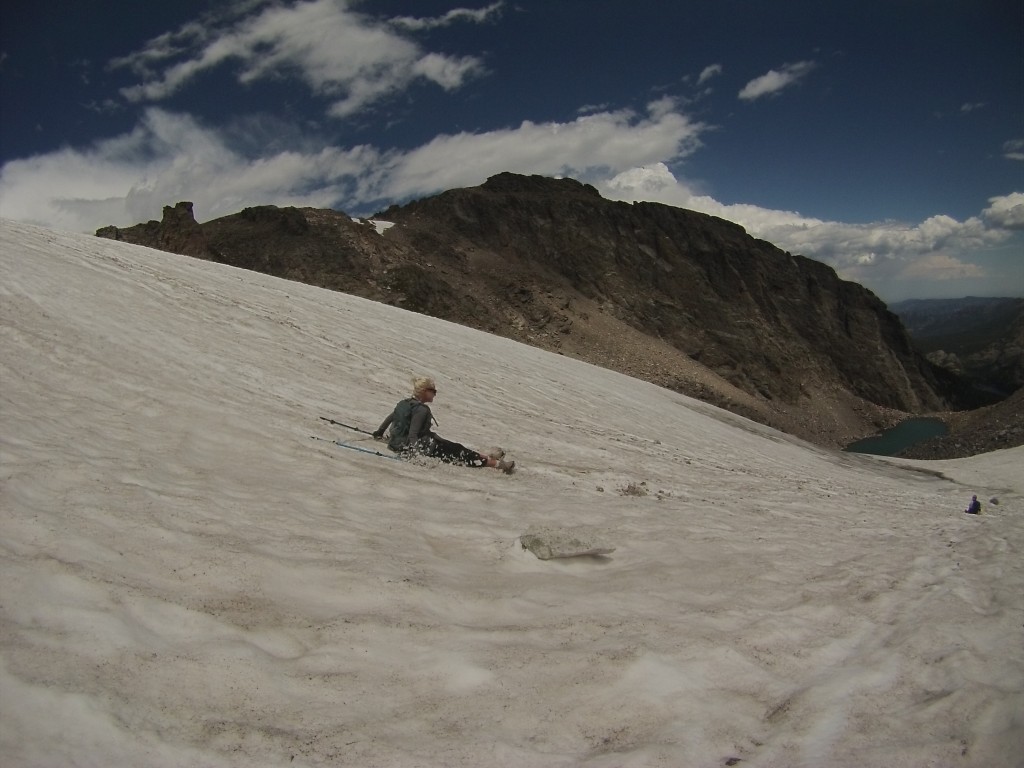14 Things to Consider When Hiking with a Beginner Hiker
So your hiking addiction and geographical location has sparked the interest of friends and family. People officially call you that hiker chick or dude behind your back. Congrats! You will now be showered with friends and family hoping to hike with you to get those perfect mountain views you are always boasting and posting about.
Hiking with people that rarely or never hike can be a freakin awesome experience if the hike is approached with a pinch of patience and some much-needed enthusiasm.
Everyone starts out as a beginner hiker but not everyone has a close friend or relative that can coach them on the basics of hiking. Get excited that someone wants to join you on a hike. Share your gear and your knowledge. Ultimately, you should awaken your inner mountain trail guide.

This is me and my cousin after she saw snow for the first time. Take your beginner on a hike they will never forget!
Hiking with a newcomer can be crazy fun. Find gratitude in your geographical place. Those new to hiking seem to find more value in every single boulder and every single tree, especially the friends and family that live at lower elevations or live in a city.
Apply these tips below while hiking with a novice hiker and the hike should be very enjoyable for the both of you. If this first experience goes well for them, they will want to continue exploring mountains and, with some practice, you might just have the perfect hiking buddy!
1. Be informative before the hike
Some of your guests might be coming from out of state and some might be coming from just a block away. Whatever your unique situation is, inform them of what to bring and wear before you two hit the trail. Your friends and family might not have much to contribute when it comes to hiking gear but you can still tell them to avoid cotton and wear athletic shoes with adequate grip. Recommend some tasty trail snacks. Inform them that checking the weather beforehand is very important. Emphasize the need for an early start.
2. Allow time for altitude adjustment
The first thing to do is to make sure your friend or family member adjusts to the altitude difference if they are coming from the land of the flat and low. Give your friend a couple days to adjust but still keep things active like biking in the city or walking a flat trail at a park or natural area nearby. It is important to at least get your guests heart rate pumping at your homes elevation before you hike to a higher elevation.
3. Go on a hike youve never done
Make this hike just as enjoyable for you as it will be for them. Give yourself new views too by doing a hike that youve never done or do your favorite summer hike in fall or winter. However, always research the trail beforehand so you know what kind of terrain and difficulty to expect. Make sure the hike is great for beginners and ALWAYS hike a scenic trail; make the hike worth the view at the end. Also, in my personal experience, many novice hikers want to know what is next in terms of terrain and views. They want to know when it gets hard or when it flattens out, etc. If youve never done the trail, this reduces the frequency of those questions.
4. Choose a hike relative to physical ability
This tip is very, very important. If you are an active hiker, hiking ten miles might actually be no big deal for you. However, ten miles of hiking is hard on nearly all beginner hikers. You must consider their physical ability and the hikes terrain, length, and weather. Not every beginner wants to hike more than a couple miles and you must be aware of that. Keep in mind that some beginner hikers are already more advanced than others. If your friend is an active runner or biker, for example, than this beginner hiker might be able to handle tougher terrain than someone that does not do much physical activity.
Furthermore, accept their input on the type of trail and the mileage. If they want to do a five mile (or less) valley trail, then you shouldn’t be forcing a lengthy mountain ascent.
Some active friends might actually say, take me on a hard hike. Show them a challenging and fun time but still keep in mind that they are new to this. Ease your friend into hiking. We must remember that hiking isnt just about walking up a slope and cardiovascular activity. It is also about technical foot placement and the ability to read rocks for ones body during bouldering and scrambling. These techniques are learned after some practice. Some beginners excel at this more than others but all beginners still lack speed and patience. So if you have a friend wanting a difficult hike, take them on a hike with some spots of bouldering and rock hopping but make sure you do not over-do the hike with too much strenuous activity that your friend becomes annoyed and frustrated.
Personal note: My sister-in-law, an ex-gymnast, did great hiking a difficult hike for ten miles. She did well in technical foot placement but struggled a bit on reading the rocks for the most efficient path for her and, therefore, her speed was slow. My triathlete cousin was able to complete a fairly difficult 12-mile hike. She did not have a problem with busting up switchbacks but she was slow at the end when it came to rock hopping and technical foot placement.

This is my sister-in-law on top of Mount Meeker. As an ex-gymnast and cross country runner, I knew should could tackle this mountain.
5. Describe the hike before departure
Once you have chosen the trail, describe the hike to them. Let them know what they should expect in regards to mileage, terrain, weather, and views. Gauge their response. If they arent totally excited about hiking eight miles, then you might want to consider a different trail. This is also when I tell them how long I think it might take (dont forget to include enough time for many breaks within this time estimate).
6. Remember the essentials
Okay, I know you are a professional and I dont mean to condescend your amazing hiker-ness but, for real, dont forget the essentials. Forgetting something like sunblock will make any newcomer to hiking hate you and hate hiking and hate mountains and hate life. Just remember to bring water and food and a first aid kit and a map and chapstick and a rain jacket and an extra pair of socks ..
I think Ive gotten my point across here.
7. Loan your gear
Loan your gear to your guests but do be picky on what gear they will use. A beginner hiker is more focused on his or her footwork, body movements, and views than the safety of your expensive, new pack. Let them use your used gear, not your new gear. They will simply be grateful that you have spare gear in the first place.
Personal note: When I have guests, I actually have guest trekking poles, guest packs, guest wind/rain jackets, and guest hiking shoes (for select sizes). All guest gear is mine and my fiancees past gear that is still fully functional but we wont die of sadness if a gear mishap does occur.
8. Teach the way of trekking poles
The art of trekking poles is just that, an art. When used correctly, trekking poles make things a lot easier while hiking. A couple of my friends have said that they never want to hike without trekking poles after hiking with poles for the first time with me.
Before you set out on the trail, educate a newcomer about trekking poles and how to properly use them to become the most efficient hiker. Tell them to bear weight on the strap (or not depending on your preferred technique) and inform them how to correctly use them on ascents and descents.
When it comes to scrambling, most beginners feel more comfortable not using trekking poles because they lack the balance and confidence needed to jump from rock to rock. They feel more comfortable to use their hands and you should cater to your beginners request if this terrain and situation arises.
9. Be mindful
Don’t just boss hog up the mountain like a bat out of hell. If you are a quick hiker, it might be best for your friend or family member if you hike behind them. Nothing is more annoying and tiring than trying to chase after you on an uphill. If you hike behind them, it reduces the inferior feeling of slowness that some (or all!) beginner hikers eventually face. Your friend will most likely apologize for being slow but accept no apology. You should expect the pace to be slower than what you are used to and that is okay. Enlighten them on those rough days before you got hiker legs of your own. Always remind them that you were a beginner hiker once too.
Cater to the novice mindset. I am always pleasantly and happily surprised when my friend wants to actually hike longer than expected but dont be disappointed if you didnt make it to the summit or decide to cut the hike short. Be aware of their energy level and always ask how they are feeling physically.
10. Carry the bulk of the weight
In regards to a day hike, a hiker-in-learning should only carry his or her water, their clothing, and a few go-to snacks. If you are carrying the bulk of the weight, this will make your friend a bit faster and will slow you down a bit too! When it comes to a backpacking trip, still be mindful of how much your friend or family member is carrying. Teach him or her how to properly pack a pack and also inform him or her of what they dont necessarily need to bring. Give them a great shake-down! Depending on the personality of your friend or family member, they will want to carry all their own gear or not but, essentially, you two will figure out very quickly what works in regards to weight once you start your backpacking trip.
11. Be knowledgeable
Okay, you hike a crap ton so I know and they know that you are knowledgeable about hiking and gear. Share this knowledge. Tell them why you choose to do this over that. Let them know your favorite hiking brands and what to invest in when (or if) they start looking for their own gear. Inform them about Leave No Trace policies. Educate them on bad weather protocol. This is especially important. If you instill these policies on their first hike, then they are more likely to implement them in the future.
Furthermore, be knowledgeable about the nature of your home state. Every single visitor I have taken hiking always asks me to identify rocks and plants and animals. I know this might be asking a lot but knowing the flowers, trees, rocks, and wildlife truly is a great thing to know as an avid hiker and amateur trail guide.
12. Take a lot of breaks
Breaks, breaks, breaks! Taking breaks are especially important. Without breaks, hiking can be seen as a strenuous activity instead of a fun adventure. Make sure you are implementing break times by being fully aware of both of your energy levels. Watch for clues of exhaustion such as a slowed pace or a sad face! Stop at view points, take pictures, and consume lots of snacks. I have come to find that I sometimes must force food on newbie hiker friends. Their body is experiencing something new and the signal for hunger doesnt always come. Make sure they are getting enough fulfilling calories during these breaks.
13. Take lots of photos!
Okay, lets be honest here. One of the only reasons your friend decided to hike with you today is to get those badass mountain views AND to get proof that he or she was there and viewing those badass mountain views in person. I like to take action shots of my friends and family while they are hiking. Definitely get a few posed pictures of the two of you but dont forget to snap a few where they are seriously doing some hiking work!

This is a great action shot of my cousin while she fearlessly glissaded down a glacier for the first time. Always remember to gauge a beginner hiker’s reaction to difficult terrain. Never continue a hike if you are sensing fear or anxiety from your friend or family member.
14. Be patient
The purpose of hiking with a beginner hiker is to educate them on ways of the trail, introduce them to this awesome activity, and to spend some quality time with them in nature. Cease your frustrations with pace, weather, or the few complaints that might be thrown your way. Approach the activity with patience and gratitude. In reality, it doesn’t really matter if your friend or family member can’t complete a hike. What matters is that he or she was willing to enter your world and share a hike with you.
In essence, I wish every newcomer to hiking had a friend or family member to show them the ropes to avoid beginner mistakes. Hiking isnt just a physical activity; it is a way to connect with nature. As avid hikers, we must act as stewards to the trail by educating our interested family and friends about Leave No Trace policies, gear, and nutrition.
Do you have any other recommendations when hiking with a beginner?
This website contains affiliate links, which means The Trek may receive a percentage of any product or service you purchase using the links in the articles or advertisements. The buyer pays the same price as they would otherwise, and your purchase helps to support The Trek's ongoing goal to serve you quality backpacking advice and information. Thanks for your support!
To learn more, please visit the About This Site page.




Comments 6
Excellent!!!
I love hiking with new hikers and sharing the love of the great outdoors with them. Some useful tips here.
Thanks for the tips! Also, great pics. Meeker is no piece of cake!!!
Great article! I recently took my sister out for her first backpacking trip and reading your article the night before made me reconsider my plan.
Ok. I’ll go there. As a beginner with no hiking or trekking experience, I’d like my friendly guide to talk to me about “going” on the trail. Some explanation of rules and strategies, and a touch of humor would help us modest (timid?) wanna’ be outdoors people.
Wonderful article & I learned alot. Thanks again!